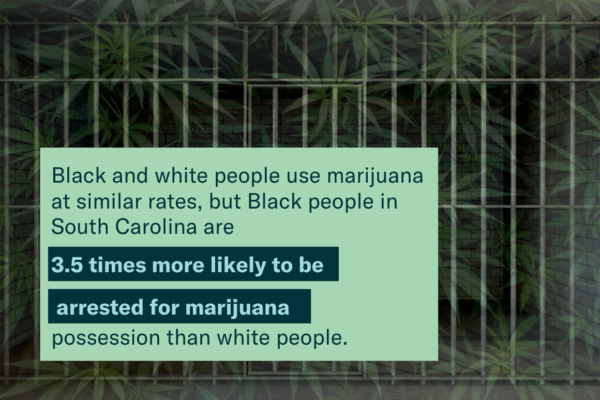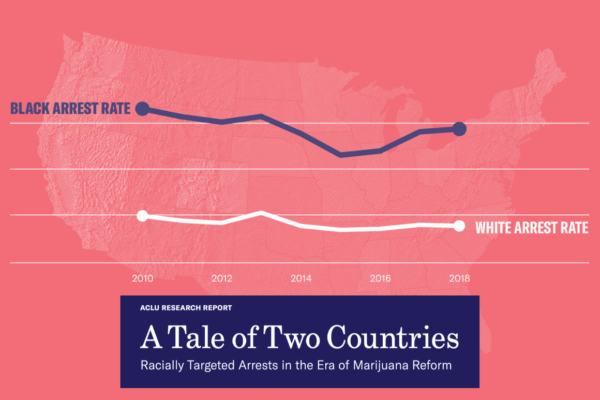A new ACLU report released today documents how South Carolina’s marijuana laws needlessly ensnare tens of thousands of people -- disproportionately Black people -- in its criminal justice system every year. Sold to the public in the name of public safety, these laws do not make us safe and ruin lives.
South Carolina has the second highest arrest rate for marijuana possession in the United States. Every 15 minutes somebody is arrested for possessing marijuana in South Carolina - a substance that is legal or decriminalized for personal use in 26 states and the District of Columbia.
South Carolina’s current marijuana laws are a monumental waste of tax dollars. For each of the 34,229 marijuana arrests in 2018, our tax dollars had to pay for a judge, a clerk, law enforcement officers, solicitors, and others to process the case. According to an economic analysis published in 2013, the 16,669 marijuana possession arrests in 2010 cost South Carolina taxpayers nearly $50 million. Between 2010 and 2018 the number of marijuana possession arrests more than doubled, meaning South Carolina taxpayers may be paying closer to $100 million each year to enforce outdated and harmful marijuana possession laws.
South Carolina’s marijuana policy is another example of its two-tiered justice system. Two people can be arrested for possessing the same amount of marijuana and face vastly differing punishments based on nothing more than their wealth. This is because access to diversion programs, which can mean the difference between having a criminal conviction and a clean record, often require fees to participate. As a result, those with wealth can pay their way to a clean record, while those without wealth are stuck with a criminal record and all of its collateral harms.
And, South Carolina’s marijuana laws, like all aspects of its criminal justice system, are enforced with a staggering racial bias. In 2018 Black people were 3.5 times more likely to be arrested for marijuana possession when compared with whites, despite both groups using marijuana at roughly the same rate. And, this disparity is on the rise, up from 1.8 times more likely to be arrested in 2001 to 2.8 times more likely to be arrested in 2010. The discriminatory enforcement of South Carolina’s marijuana laws means that Black people are more likely to face the immediate harms of a marijuana possession conviction, including potential incarceration, criminal records, the loss of jobs, housing, financial aid eligibility, and child custody.
The discriminatory enforcement also compounds the harms that already exist because of the racial wealth divide - a divide born from slavery and maintained though racist policies including regressive taxation, lending and pay discrimination, and unequal education, to name a few. White families in the United States have a median household wealth of $171,000 while Black families median household wealth is just $17,600. Because of this vast economic inequality, the reduced ability to participate in a diversion program and the collateral harms of a marijuana conviction, including its associated fines and fees, disproportionately push Black people into cycles of never ending debt, poverty, and further contact with the criminal justice system.
It’s time for our communities to define and advance our vision for what a just, equitable, and safe South Carolina should look like. And, part of this vision must be the legalization of marijuana with racial equity at the foundation of such reform.


